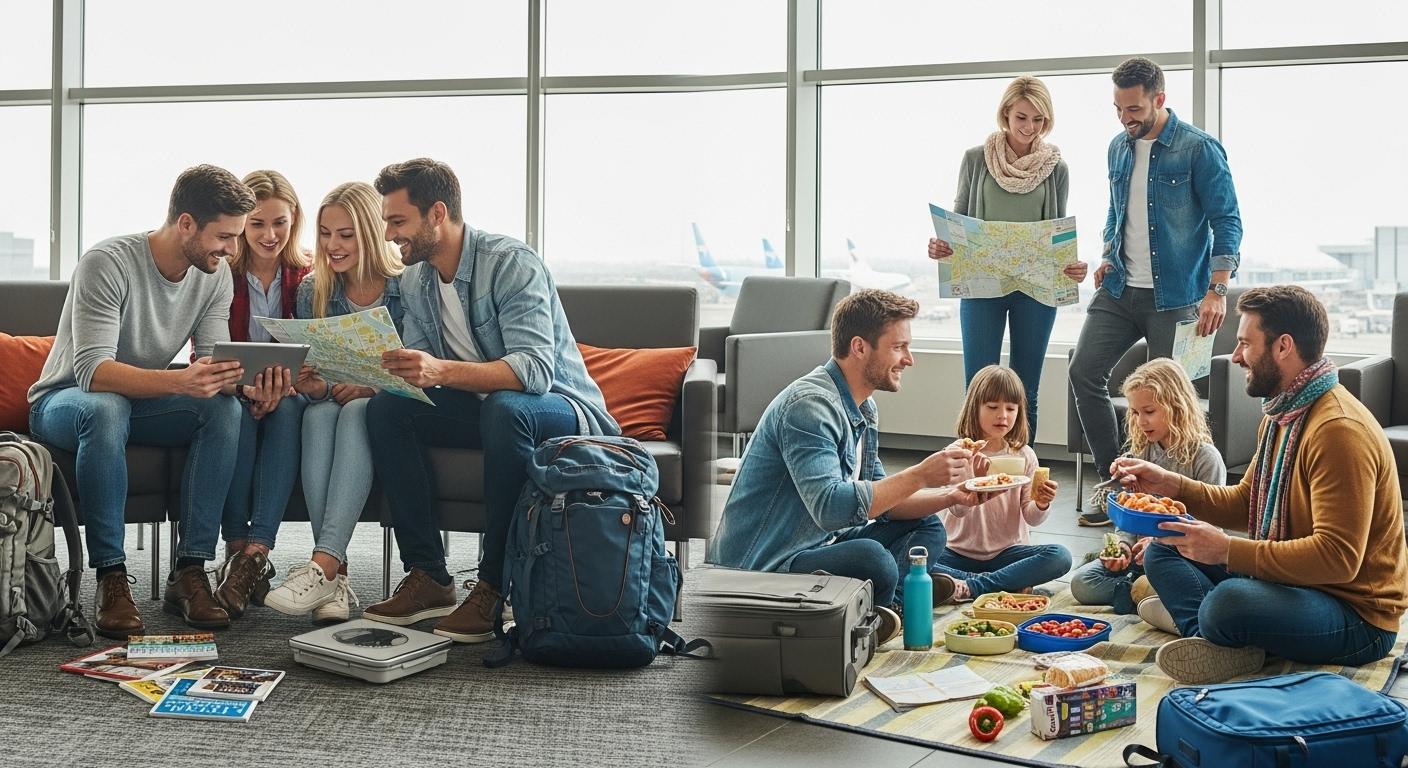Saving money while traveling seems nearly impossible when you see how flights, hotels, and tours can eat up your budget. Most would be shocked to learn that traveling during off-peak seasons can help you save up to 40% on your overall expenses. But here is where things get really interesting. The real secret is not just about finding deals, but about using timing, flexibility, and a few clever strategies to unlock a whole world of affordable adventures you probably never knew existed.
Table of Contents
- 1: Plan Your Trip During Off-Peak Seasons
- 2: Use Budget Airlines and Compare Fares
- 3: Book Accommodations Wisely With Discounts
- 4: Harness Public Transportation for Savings
- 5: Explore Free and Low-Cost Attractions
- 6: Pack Smart to Avoid Extra Fees
- 7: Prepare Meals to Cut Food Costs
- 8: Use Travel Apps for Deals and Planning
- 9: Take Advantage of Local Resources and Tips
- 10: Create a Flexible Itinerary for Unexpected Savings
Quick Summary
| Takeaway | Explanation |
|---|---|
| Travel during off-peak seasons for savings. | Reducing travel costs up to 40% is achievable by booking during times when fewer tourists visit your destination. |
| Utilize budget airlines and compare fares. | By being flexible with flight dates and comparing platforms, travelers can save up to 50% on airfare. |
| Leverage public transportation for cost efficiency. | Using local transit can cut travel expenses by up to 70% compared to taxis or rental cars, while enhancing cultural immersion. |
| Prepare meals to reduce food expenses. | Cook meals instead of dining out, significantly lowering food costs and providing a cultural connection through local cuisine. |
| Create a flexible itinerary for unexpected deals. | Keeping an adaptable travel plan helps seize spontaneous options and can lead to saving up to 50% on expenses. |
1: Plan Your Trip During Off-Peak Seasons
Travel enthusiasts searching for budget travel tips know that timing can make a massive difference in trip expenses. Choosing to travel during off-peak seasons is a strategic approach that can dramatically reduce your overall travel costs. Seasonal variations significantly impact pricing across flights, accommodations, and local attractions.
Off-peak travel periods typically occur when destinations experience lower tourist traffic. These windows can vary depending on the location but generally fall between major holiday seasons and peak vacation months. For travelers willing to be flexible, this strategy offers substantial financial advantages.
There are several compelling reasons to embrace off-peak travel:
-
Dramatically reduced prices for flights and accommodations
-
Fewer crowds at popular tourist destinations
-
More authentic travel experiences with less tourist congestion
According to Forbes Travel Guide, traveling during shoulder seasons can help travelers save up to 40% on typical travel expenses. This means significant savings without compromising the quality of your travel experience.
For those looking to maximize their budget, consider destinations with inverted seasonal patterns. For instance, European cities like Paris become more affordable during late autumn and early spring, while tropical destinations offer better rates during their rainy seasons. Lonely Planet recommends researching specific destination climate patterns to identify optimal budget travel windows.
The key is researching and planning ahead. Flexibility is your greatest asset when seeking budget travel opportunities. By understanding seasonal pricing trends and being open to alternative travel dates, you can unlock significant savings and create memorable travel experiences without breaking the bank.
2: Use Budget Airlines and Compare Fares
Savvy travelers understand that finding affordable flight options is a critical component of budget travel. Budget airlines have revolutionized travel accessibility, offering significantly lower prices compared to traditional carriers. However, navigating these options requires strategic planning and thorough research.
Comparing fares across multiple platforms is crucial for securing the best deals. Modern travelers have numerous digital tools at their disposal to track and analyze flight prices. Understanding who sets airline fares can provide deeper insights into pricing strategies and help you make informed decisions.
Key considerations when exploring budget airline options include:
-
Hidden fees that might increase total travel costs
-
Baggage restrictions and additional charges
-
Flight schedules and potential layovers
According to Skyscanner, budget airlines can offer savings up to 50% compared to traditional carriers. Flexibility is paramount when seeking these deals. Travelers willing to adjust travel dates, accept less convenient flight times, and pack light can maximize their potential savings.
Utilize price comparison websites and set up fare alerts to track price fluctuations. Some platforms offer predictive analytics that suggest the best times to book flights. Booking midweek and avoiding peak travel seasons can result in substantial discounts.
Remember that budget doesn’t always mean compromising comfort. Many low-cost carriers now provide quality services while maintaining competitive pricing. By conducting thorough research, comparing multiple options, and remaining adaptable, travelers can unlock significant savings on their airline expenses.
3: Book Accommodations Wisely with Discounts
Budget travelers know that accommodation expenses can quickly consume a significant portion of travel funds. Strategic booking approaches can help minimize these costs and maximize travel value. By understanding the nuances of accommodation pricing, travelers can unlock substantial savings.
9 Hacks to Book a Room at the Cheapest Hotel reveals multiple strategies for reducing lodging expenses. Different accommodation types offer unique advantages for budget-conscious travelers.
Important strategies for smart accommodation booking include:
-
Utilizing price comparison websites
-
Booking directly with hotels for potential discounts
-
Considering alternative lodging options like hostels or vacation rentals
According to Booking.com, travelers can save up to 30% by booking accommodations during off-peak seasons and being flexible with location. Membership programs and loyalty rewards can provide additional cost reductions.
Digital platforms now offer numerous options beyond traditional hotels. Hostels, guesthouses, shared apartments, and homestays present more affordable alternatives. Timing and flexibility are key. Booking midweek, avoiding peak tourist seasons, and staying slightly outside city centers can dramatically reduce expenses.
Advanced travelers leverage multiple strategies. Some credit cards offer travel rewards, while others provide hotel booking discounts. Some booking platforms offer price match guarantees and cashback opportunities. Researching and combining these approaches can result in significant savings.
4: Harness Public Transportation for Savings
Public transportation represents one of the most effective strategies for reducing travel expenses. Smart travelers understand that local transit systems offer far more than just affordable movement they provide an authentic glimpse into local culture and daily life.
Understanding the Budget Travel Planning Guide emphasizes the importance of transportation planning as a core budget travel strategy. Different destinations offer unique public transit options that can dramatically cut travel costs.
Key advantages of using public transportation include:
-
Significantly lower costs compared to taxis or rental vehicles
-
Reduced stress from navigating unfamiliar roads
-
Opportunities for cultural immersion and local interactions
According to The World Bank, well-developed public transit systems can reduce individual transportation expenses by up to 70% compared to private vehicle usage. City passes and multi-day transit tickets often provide additional savings, allowing unlimited travel within specific timeframes.
Technological advancements have made public transportation navigation easier than ever. Smartphone apps now provide real-time routing, schedules, and payment options. Digital transit maps and translation features help travelers confidently explore new cities without language barriers.
Budget travelers should research local transit options before arrival. Some cities offer extensive subway systems, while others rely more on buses or shared transportation. Understanding local transit infrastructure can help you plan more economical and efficient travel routes.
5: Explore Free and Low-Cost Attractions
Budget travel doesn’t mean sacrificing memorable experiences. Smart travelers understand that incredible adventures can be discovered without spending excessive money. Many destinations offer remarkable attractions that cost little to nothing.
Affordable Ways to See the World highlights the numerous opportunities for budget-conscious explorers to enjoy rich cultural experiences without breaking the bank.
Strategies for finding free and low-cost attractions include:
-
Researching city tourism websites for complimentary events
-
Visiting public parks and historical landmarks
-
Taking advantage of museum free admission days
According to Smithsonian Magazine, many world-class museums offer free entry during specific times or days. Cultural immersion doesn’t require expensive tickets. Walking tours, public markets, and community festivals frequently provide authentic experiences at no cost.
Technology has made discovering budget attractions easier. Numerous smartphone apps and websites specialize in listing free local events and attractions. City tourist boards often provide comprehensive guides to low-cost or no-cost activities that many travelers overlook.
Seasonal considerations can also impact attraction costs. Some cities offer free concerts, outdoor performances, and cultural events during summer months. University campuses frequently host public lectures, art exhibitions, and performances that are open to travelers. By remaining flexible and resourceful, budget travelers can create rich, memorable experiences without substantial financial investment.
6: Pack Smart to Avoid Extra Fees
Strategic packing is a critical skill for budget travelers seeking to minimize unnecessary expenses. Airlines and transportation services increasingly charge substantial fees for oversized, overweight, or additional luggage, making smart packing essential for cost-conscious travelers.
Travel Smart: Essential Tips for Affordable Adventures Around the Globe emphasizes the importance of understanding baggage policies before departure.
Key considerations for efficient packing include:
-
Checking specific airline baggage weight and size restrictions
-
Using compact, lightweight luggage
-
Packing versatile clothing items that can be mixed and matched
According to IATA (International Air Transport Association), baggage fees can represent a significant unexpected expense for travelers. Carry-on luggage strategies can save considerable money, with some budget airlines charging up to $50 for checked bags.
Technology offers innovative solutions for travelers. Digital luggage scales, compression packing cubes, and mobile apps that track airline regulations help travelers optimize their packing. Layering clothing and wearing bulky items during travel can further reduce luggage weight and associated fees.
Additional money-saving packing tips include bringing travel-sized toiletries, selecting wrinkle-resistant fabrics, and planning laundry opportunities during longer trips. By approaching packing as a strategic financial decision, travelers can significantly reduce travel expenses before even leaving home.
7: Prepare Meals to Cut Food Costs
Food expenses can quickly derail a travel budget, making meal preparation a crucial strategy for budget-conscious travelers. Smart travelers recognize that dining out for every meal can consume a significant portion of their travel funds.
Some travelers mistakenly believe that preparing meals means sacrificing culinary experiences. In reality, cooking can be an immersive cultural adventure that connects you more deeply with local food traditions and communities.
Key strategies for budget meal preparation include:
-
Booking accommodations with kitchen facilities
-
Shopping at local markets and grocery stores
-
Packing portable cooking equipment like compact travel stoves
According to The Bureau of Labor Statistics, Americans spend approximately 37% of their food budget on dining out. Travelers can dramatically reduce expenses by adopting a similar approach abroad.
Technology has made meal planning easier. Smartphone apps can help locate affordable grocery stores, translate ingredient labels, and find budget-friendly local recipes. Hostel kitchens and shared accommodations offer excellent opportunities for communal cooking and meeting fellow travelers.
Additional money-saving tactics include carrying reusable containers, packing lightweight cooking utensils, and learning basic local recipes. By transforming meal preparation into an enjoyable travel experience, budget travelers can save money while gaining deeper cultural insights.
8: Use Travel Apps for Deals and Planning
Digital technology has transformed budget travel, offering travelers unprecedented access to real-time deals, planning tools, and money-saving resources. Smart travelers leverage smartphone applications to optimize every aspect of their journey.
Understanding Types of Travel Booking Sites highlights the evolving landscape of digital travel planning tools that can significantly reduce travel expenses.
Key travel app categories for budget travelers include:
-
Price comparison platforms
-
Offline navigation tools
-
Currency conversion applications
According to TechCrunch, mobile travel bookings increased by 40% in recent years, demonstrating the growing reliance on digital planning tools. Comprehensive travel apps can help travelers track expenses, find last-minute deals, and navigate unfamiliar destinations with ease.
Most budget travelers benefit from multi-functional apps that combine multiple services. Some applications offer features like price tracking, fare alerts, offline maps, language translation, and local recommendation engines. Downloading offline versions of maps and translation tools can help travelers avoid expensive roaming charges while staying connected.
Additional strategies include setting up price alerts, using apps that aggregate discount codes, and joining digital loyalty programs. By embracing technology, budget-conscious travelers can access a wealth of resources that transform traditional travel planning into a streamlined, cost-effective experience.
9: Take Advantage of Local Resources and Tips
Local knowledge is a budget traveler’s most valuable and often overlooked resource. Engaging with residents and understanding local perspectives can unlock significant savings and authentic experiences that traditional tourist guides miss.
Understanding the Travel Planning Process emphasizes the importance of connecting with local communities for insider travel strategies.
Effective ways to tap into local resources include:
-
Connecting with local hostels and community centers
-
Participating in free walking tours
-
Engaging with local social media groups and forums
According to National Geographic, travelers who interact with residents can save up to 30% on typical travel expenses by discovering insider tips on affordable dining, transportation, and hidden attractions.
Locals possess unparalleled insights into budget-friendly alternatives that are often invisible to tourists. Conversations with residents can reveal affordable restaurants, free cultural events, public transportation shortcuts, and negotiation strategies for markets and services.
Technology has made connecting with locals easier than ever. Language exchange apps, travel forums, and social platforms allow travelers to build connections before and during their trips. By approaching travel with curiosity and openness, budget travelers can transform their journey from a simple vacation to an immersive, cost-effective cultural experience.
10: Create a Flexible Itinerary for Unexpected Savings
Flexibility is the secret weapon of budget travelers, enabling them to capitalize on spontaneous deals and unexpected opportunities. A rigid travel plan can often lead to missed savings and increased expenses.
How to Find Cheap Flights for Your Next Adventure highlights the importance of adaptable travel strategies that maximize financial efficiency.
Key principles of creating a flexible travel itinerary include:
-
Maintaining a loose, adaptable schedule
-
Being open to alternative destinations
-
Monitoring last-minute travel deals
According to Travel + Leisure, spontaneous travelers can save up to 50% on travel expenses by remaining adaptable and responsive to emerging opportunities. Unplanned detours can often result in the most memorable experiences.
Digital tools now make flexible travel planning easier than ever. Real-time fare comparison websites, last-minute booking platforms, and destination-agnostic search engines allow travelers to discover unexpected savings. Some travelers even embrace a completely open-ended approach, allowing available deals to dictate their travel route.
The most successful budget travelers view their itinerary as a suggested framework rather than a strict roadmap.
Below is a comprehensive table summarizing the 10 essential budget travel tips discussed in the article, providing a concise overview of each tip along with its main benefits for smart travelers.
| Tip | Key Approach | Main Benefits and Outcomes |
|---|---|---|
| Travel During Off-Peak Seasons | Plan trips when fewer tourists visit to secure lower prices | Save up to 40% on flights and accommodations; enjoy fewer crowds and more authentic experiences |
| Use Budget Airlines and Compare Fares | Choose low-cost carriers and use fare comparison tools | Save up to 50% on flights; maximize savings through flexibility and research |
| Book Accommodations Wisely | Compare prices, book directly, and consider alternative lodging | Save up to 30%; access loyalty discounts; optimize cost by being flexible |
| Harness Public Transportation | Utilize buses, trains, and city passes | Reduce transit costs by up to 70%; experience local culture |
| Explore Free and Low-Cost Attractions | Seek out complimentary or low-price sights and events | Enjoy authentic travel experiences without high expenses |
| Pack Smart to Avoid Extra Fees | Travel light and know baggage policies | Avoid hefty airline baggage fees; pack efficiently and save money |
| Prepare Meals to Cut Food Costs | Cook using accommodations with kitchens and shop at local markets | Reduce food expenses; gain cultural immersion through local ingredients |
| Use Travel Apps for Deals and Planning | Leverage digital tools for bookings, navigation, and discounts | Find real-time deals; save money and plan efficiently |
| Take Advantage of Local Resources | Connect with locals and seek insider tips | Discover authentic, affordable options; save up to 30% on various expenses |
| Create a Flexible Itinerary | Keep plans adaptable for last-minute deals and changes | Save up to 50% on travel costs; seize spontaneous opportunities |
| By maintaining a sense of adventure and willingness to pivot, travelers can transform potential travel challenges into exciting, cost-effective opportunities. |
Unlock Real Savings with PilotTravelDeals: Your Partner for Smart Budget Travel
Traveling on a budget brings real challenges: finding good deals, managing hidden costs, and turning flexibility into actual savings. If you are motivated by the essential tips in this article—like booking during off-peak seasons, comparing flight fares, and using smart technology—your next logical step is to access tools that make these strategies simple and effective. Visit our Travel Tips section for more actionable advice designed specifically for cost-conscious travelers like you.

Ready to put your budget travel strategies into action? Start with PilotTravelDeals.com. Compare the best flight, hotel, and rental offers from trusted providers all in one place. Maximize your savings and streamline your planning—search, book, and travel smarter today.
Frequently Asked Questions
What are some effective ways to reduce travel expenses?
Planning your trip during off-peak seasons, using budget airlines, booking wisely, utilizing public transportation, and exploring free attractions are all effective strategies to save on travel expenses.
How can I find the best flight deals?
To find the best flight deals, compare fares across multiple platforms, use price comparison websites, set up fare alerts, and be flexible with your travel dates and times.
What should I consider when booking accommodations?
When booking accommodations, consider using price comparison websites, booking directly with hotels for potential discounts, being flexible with your location, and exploring alternative lodging options like hostels or vacation rentals.
What are some ways to save on food costs while traveling?
To save on food costs, consider booking accommodations with kitchen facilities, shopping at local markets, packing portable cooking equipment, and preparing some meals yourself to reduce dining expenses.
Recommended
- Travel Smart: Essential Tips for Affordable Adventures Around the Globe – PilotTravelDeals.com
- Understanding the Budget Travel Planning Guide – PilotTravelDeals.com
- Understanding the Travel Planning Process: A Comprehensive Guide – PilotTravelDeals.com
- How to Find Cheap Flights for Your Next Adventure – PilotTravelDeals.com
- Top Tips for Saving Money on Travel in the United States – Yopki




